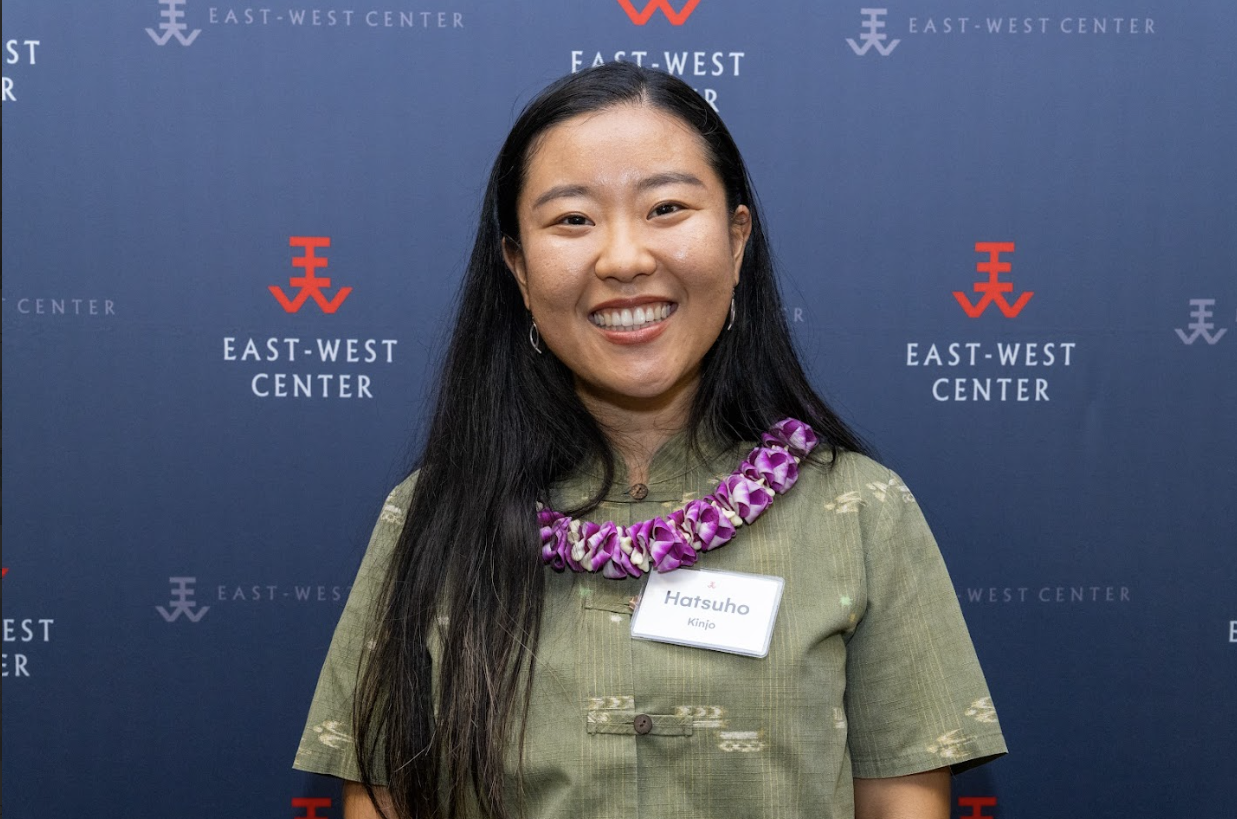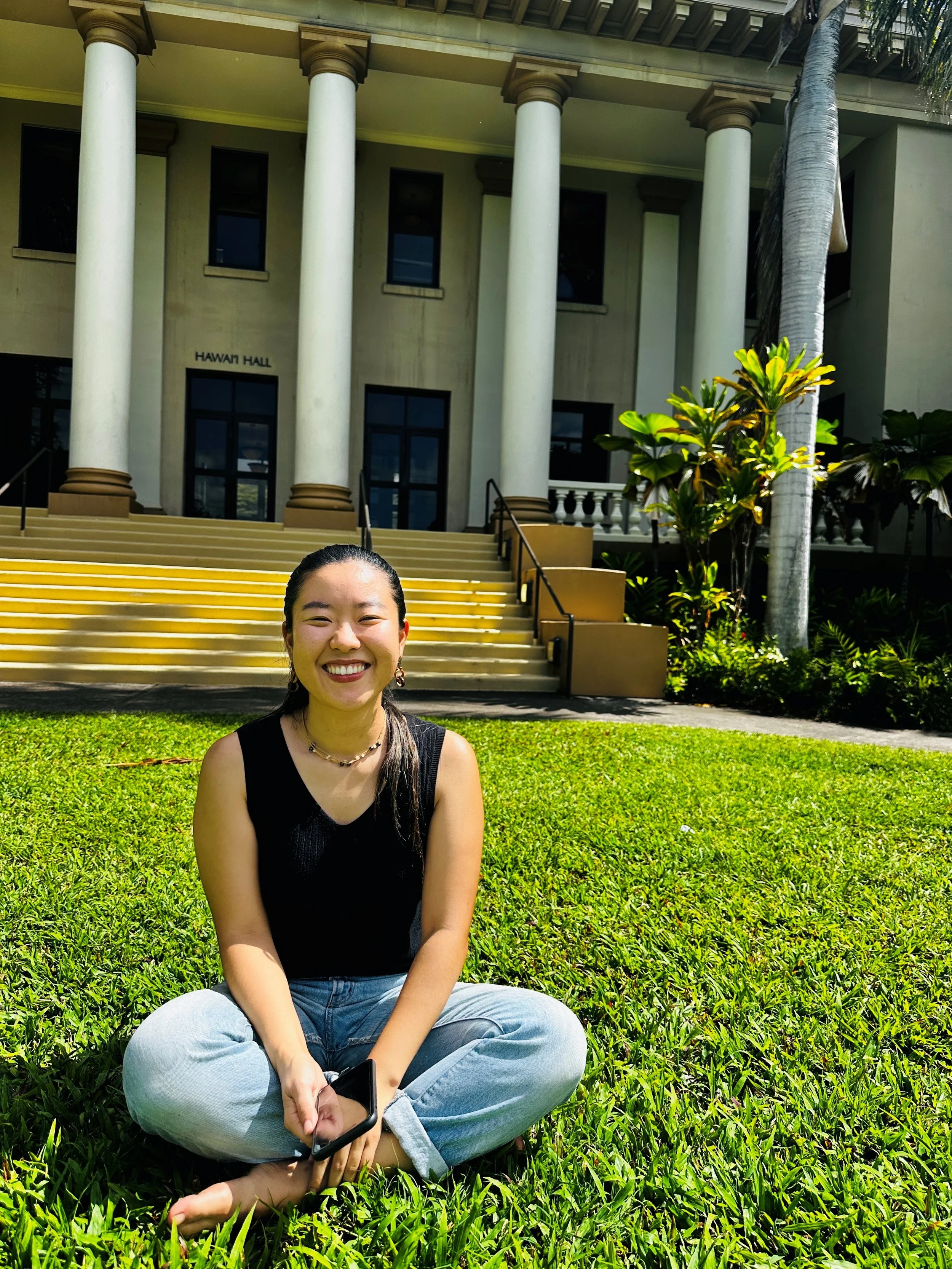Hatsuho Kinjo (Okinawa)
Obuchi Student Scholar
Hatsuho Kinjo is a current Obuchi Scholar from Okinawa. She holds a degree in International Relations with a minor in Southeast Asian Studies from Sophia University in Tokyo. She is currently pursuing a Master of Education in Curriculum Studies at the University of Hawai‘i at Mānoa’s College of Education, focusing on Place and Community-based Education and a Graduate Certificate in Pacific Island Studies.
Hatsuho previously served as Co-Intern for EWC’s Fall 2025 Community Building Institute. In addition to the Obuchi Student Scholarship, she is a past recipient of the Michael and Margie Berueda Scholarship and EWCA Okinawa Chapter Endowment Award.
Keynote Remarks by Hatsuho Kinjo
EWC Foundation’s 2025 Scholarship Celebration Dinner
November 6, 2025
はいさい、ぐすーよーちゅーがなびら。
わんねー金城(かなぐしく)初穂やいびーん、うちなーや うらしーからちゃーびたん。ゆたさるぐとぅうにげーさびら。
くんぐとーる 挨拶(えーさち)ぬ場くぃみそーち、御礼事(ぐりーじ)御申上(うんぬき)やびら。
(Greeting in Okinawan)
I respectfully acknowledge the Kānaka Maoli, the Indigenous people of Hawaiʻi, who have lived in a deep relationship with this land. I honor their sovereignty, their resilience, and their continued stewardship of the land and waters of these islands.
My name is Hatsuho Kinjo, and I come from the beautiful island of Okinawa. It is a great privilege to be here and to share this special moment with all the EWC ʻohana, especially in this memorable year—the 25th anniversary of the Obuchi Student Scholarship—which symbolizes the lasting connection between Okinawa and Hawaiʻi.
Okinawa—a place that evokes a very special feeling in me—is a land filled with breathtaking nature, a rich and resilient culture, and powerful human connections. Once known as the Loochoo Kingdom, it served as a hub that connected Asia and the Pacific, a mysterious place where diverse cultures intertwined among its small islands, creating a vibrant mosaic of traditions.
The vivid and striking colors that meet your eyes in Okinawa also veil a deep sorrow underneath their brilliance.
The long history of colonization, the continuing presence of structural violence, and the realities of militarization have become so deeply embedded—so normalized—that they permeate our everyday lives, often without us even noticing.
As I unconsciously consumed these forms of colonialism, I came to feel that Okinawa itself was a source of shame. The Okinawan school system, the voice of society, and the very design of social structure had taught me to feel in this way.
For me, facing Okinawa was an impossible task—one that my EWC family, along with friends and teachers here in Hawai‘i, challenged me to take on. Through their support, I was able to truly face Okinawa.
Various encounters at EWC and my learning experiences in Hawai‘i were a refreshing shock, forcing deep, inescapable self-reflection.
What had been a symbol of shame for me—the Okinawan language, culture, way of knowing, and way of life—was a source of pride for others. When I encountered their pride, at first, I was confused. I had to admit that I did not possess the very foundation on which their pride stands.
Meeting the many admirable EWC ʻohana and friends here in Hawai‘i, people who understand the paths they and their people have walked and who stand firmly upon them was, for me, a long-avoided encounter with Okinawa itself.
The learning I experienced here at EWC was not the kind that makes the world spin around.
It was the kind that makes you see the same scenery and yet, it can never be the same again. It was like color being poured into a black-and -white photograph. EWC gave me a learning so transformative that I can no longer see the world the way I used to.
I am currently majoring in place-based education, an academic field that grounds learning in the land, the environment, history, culture, and memories. Here in Hawai‘i, this approach is deeply connected to Indigenous-based education. My learning here in Hawai‘i takes place in a symbolic space where the Kānaka Maoli people have long fought to reclaim their education. I recognize that this very space of learning can also be a place for trauma to heal. For this reason, I feel an indescribable gratitude toward my kumu and friends, who have opened this space and allowed me and others who carry similar pain and struggles to enter and learn.
Their approach inspired me to reflect on my own privilege and positionality here in Hawai’i. EWC’s Community Building Institute (CBI) internship, which I had the privilege to undertake in summer 2025, represents an evolving approach to exploring how I can express both my gratitude for this land and my own kuleana (responsibility).
Each August, the East-West Center dedicates two weeks to a new student orientation designed to transform us into a family, into a single community, through the Community Building Institute. Two weeks may seem intense, but it shows just how much effort EWC puts into building that sense of togetherness.
In this year’s CBI, each of us was given a space to reflect on the place we have come to study and live, to learn about the history and mo'olelo (stories) that flow in this land of Hawai‘i, and to immerse ourselves in the land and water, as a way to consider our own positionality. I hope that this space will serve as a guide for EWC students whenever they feel lost, and that in moments of difficulty, they will remember that they have cherished companions here to walk with them.
We, who are privileged to come here to learn in this land of Hawai’i and who also carry the stories, culture, and pride from our home communities, must show the deepest respect for this land and reflect on the responsibilities we hold as we stand here.
We must not be mere consumers of culture and the land, or the histories and stories that people have woven over generations. Instead, we must consider how we can walk hand-in-hand together. We have all been granted the privilege to learn here and now; it is our turn to give back.
The deepest way I can express my gratitude for what I have learned through EWC and in Hawai‘i is to continue facing Okinawa. To bring back to Okinawa an education that allows people to forgive themselves, to recognize, and to embrace who they truly are.
The beauty of Okinawa is not the kind often described by tourists or outsiders—the shiny, plastic-like beauty.
Instead, our beauty is raw, yet surprisingly pure.
It is a beauty that carries the pulse of life, that pierces your body, a beauty that comes with pain.
And it is here, through every one of you present today, and through this land of Hawai‘i, that I have been taught to see this beauty of Okinawa.
Thank you, いっぺーにふぇーでーびる.
Hatsuho Kinjo/金城初穂




